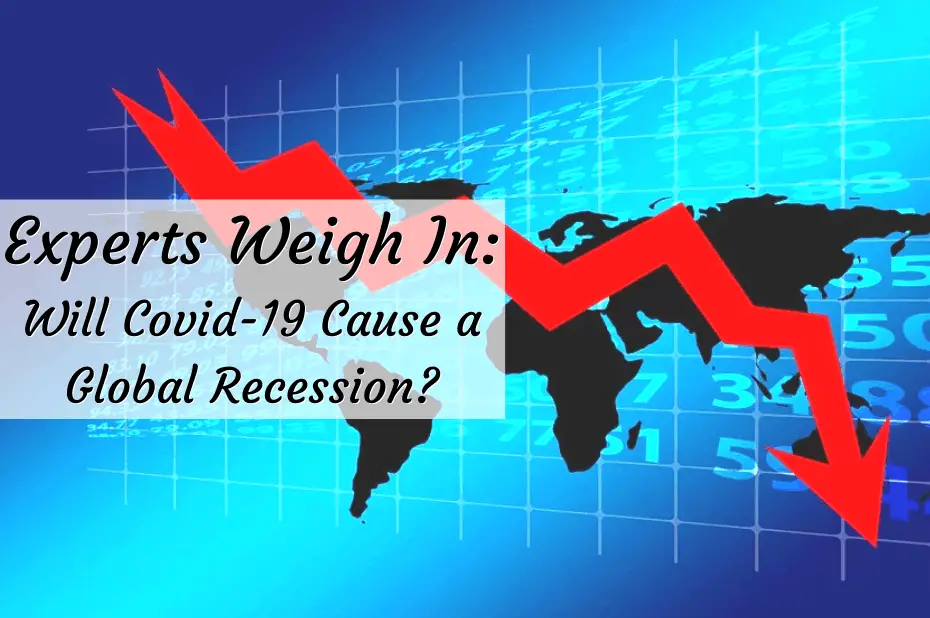Our world seems to have ground to a halt, with governments and corporations around the world reacting to the spread of the novel coronavirus. Stock markets have been a roller coaster, with huge drops triggering the circuit breakers that halt trading temporarily. Then a day or two later, followed by surprising stock market gains. Many governments around the world have responded by closing schools, banning some international flights, and discouraging gatherings of more than a few hundred people. Numerous corporations have responded by cancelling events and encouraging employees to work from home, if possible. These are all short-term impacts that affect us right away. But what will be the long-term fallout of all this? Will COVID-19 cause a global recession in 2020?
This post may contain affiliate links, which means I make a small commission if you decide to purchase something through that link. This has no cost to you, and in some cases may give you a discount off the regular price. If you do make a purchase, thank you for supporting my blog! I only recommend products and services that I truly believe in, and all opinions expressed are my own. As an Amazon Associate I earn from qualifying purchases. Please read my disclaimers for more information.
For all my articles on this theme, go to Personal Finance during the Coronavirus Pandemic.
What is the Definition of a Recession?
A recession is traditionally defined as two consecutive quarters of negative growth, as measured by decline in real GDP. There’s a lot of jargon there, so let’s look a little closer. Two consecutive quarters is six months. GDP, or gross domestic product, is a measure of the total value of all the goods and services produced. “Real” GDP means that it’s adjusted for inflation.
Recessions generally occur when there’s a widespread drop in spending. It is often accompanied by higher unemployment. A severe recession, such as real GDP falling by 10%, or a prolonged recession for several years, could be called an economic depression.
However, governments have multiple options available to them to help mitigate a downturn in the economy:
- Lowering interest rates – we have already seen this here in Canada and elsewhere.
- Increased government spending – we have seen specific spending commitments directly related to preventing widespread infection, but this could also include more general government spending.
- Tax cuts to promote business investment.
Can Stock Market Crashes Predict Recessions?
There is some evidence that a decline in stock markets can be followed by a recession, but not always.
In Stocks for the Long Run, Siegel mentions that since 1948, ten recessions were preceded by a stock market decline, by a lead time of 0 to 13 months (average 5.7 months), while ten stock market declines of greater than 10% in the Dow Jones Industrial Average were not followed by a recession.
Wikipedia “Recession”
At this point (March 19, 2020), world stock markets have plunged by about one-third from their recent peaks:
- TSX (Canada) -32%
- S&P500 (US) -29%
- Dow (US) -32%
- FTSE (UK) -33%
- Nikkei (Japan) -31%
In one week we have seen shocking daily declines followed by unexpected price increases. This is to say, stock markets have been especially volatile lately. But despite some good days, they are still substantially below their peaks.
To reassure anyone who is concerned about their investments, over the long run history shows us that stock markets always go up. Volatility is to be expected, but the trend is up.
Related Reading:
- What Everyone Should Know about Economics during COVID-19
- What Should you do When the Stock Market Crashes?
- Will the Stock Market Crash in 2020?

Recent Cancellations due to COVID-19
Within one week we have seen massive retractions around the world:
- Most professional sports have cancelled tournaments and/or suspended their season.
- Theatre productions and concerts have been cancelled or postponed.
- Some cruise lines have cancelled future sailings, after two ships were impacted by coronavirus.
- Disney has closed its theme parks.
- Many museums, art galleries, zoos, and other attractions have shut their doors.
- Major conferences have been cancelled, such as Facebook’s developer conference.
- Movies have delayed their release dates, fearful of empty theatres and low ticket sales.
- Some TV and film shows have suspected production for several weeks.
- Millions of travel plans for family vacations and business travel have been cancelled, affecting airlines, hotels, and more.
How Will Cancellations Affect the Economy?
In the months to follow, we may see some of this lost spending come back. For instance, families who have cancelled a trip to Disney will probably rebook one for later this year or next year.
But much of this lost spending is gone for good. If sports teams finish their season with fewer games, that means lower ticket sales, less revenue for the stadium, lost revenue for the food and beverage vendors, loss of income for hourly workers, and so on.
To the extent that people stay home and social distance, there is also less spending at retail stores, restaurants, and other day-to-day spending. This is also unlikely to be made up in future months. After all, if you forego your daily latte for three weeks, are you likely to buy 2 lattes a day for the next three weeks?
On the manufacturing side, there are potential issues with supply chain disruptions. That is, when component parts are made in an area where factories are closed due to the coronavirus, their products cannot be distributed to downstream assembly plants.
Not all industries will be negatively affected. It seems like grocery stores are booming at the moment, with stock flying off the shelves. However, all this “stocking up” may mean lower sales in the near future. But overall, if people aren’t eating out at restaurants, they need more groceries.

Oil Prices Add More Downside Risk
Saudi Arabia recently announced it would significantly ramp up production of oil. This extra supply of oil, combined with decreased demand as travel grinds to a halt, will likely mean substantially lower prices. That seems great for us at the gas pump, but for oil-producing provinces and states this is a real blow to their economies.
What do Economists Say: Will COVID-19 Cause a Recession in Canada?
NOTE: This section has been updated for current forecasts as of April 12, 2020.
All five of Canada’s big banks have updated their economic forecasts. They all agree that the first quarter of 2020 will see modest declines in real GDP growth. “Modest” being a relative term! At any other point we’d consider -4.4% to be fairly important! The forecasted decline in growth for Q2 varies widely from bank to bank, but they all agree that it’ll be massive. The range of decline is from -24.8% to -45%!
But in every case, they believe we will end the year with strong growth in both quarters 3 and 4.
Will we see a recession in Canada, defined as two consecutive quarters of negative growth? All the banks agree that yes, we will see exactly 2 quarters of negative real GDP growth – the common definition of recession.
Canada: Change in Real GDP
| 2020Q1 | 2020Q2 | 2020Q3 | 2020Q4 | |
|---|---|---|---|---|
| CIBC | -3.8% | -27.5% | 16.6% | 10.6% |
| RBC | -4.0% | -32.0% | 20.0% | 8.0% |
| TD | -4.4% | -24.8% | 9.9% | 8.7% |
| BMO | -6.5% | -45.0% | 75.0% | 10.0% |
| Scotiabank | -3.4% | -28.1% | 12.3% | 15.8% |
| Average | -4.4% | -31.5% | 26.8% | 10.6% |
Will COVID-19 Cause a Recession in United States?
Economists are a little more optimistic about the forecast south of the border. All the banks agree that the U.S. will face negative growth in Q1 and Q2. Since a recession is defined as two consecutive quarters of below zero real GDP, this implies a recession for the U.S. However, the decline isn’t quite as steep as in Canada.
Like Canada, economists predict a very short slowdown, with strong growth at the end of 2020.
USA: Change in Real GDP (Y/Y percent change)
| 2020Q1 | 2020Q2 | 2020Q3 | 2020Q4 | |
|---|---|---|---|---|
| CIBC | -3.1% | -27.9% | 18.8% | 10.0% |
| RBC | -3.0% | -35.0% | 10.0% | 20.0% |
| TD | -1.9% | -27.0% | 12.8% | 9.0% |
| BMO | -5.0% | -39.6% | 54.9% | 5.1% |
| Scotiabank | -2.1% | -20.7% | 13.4% | 7.7% |
| Average | -3.0% | -30.0% | 22.0% | 10.4% |
Economic Forecast Sources:
World Economic Growth
Countries around the globe are asking – or telling – their citizens to stay home. I think it’s fair to say that most if not all countries affected by COVID-19 will experience significant slowdowns in economic growth this spring.
However, many governments have responded by lowering interest rates and pledging financial help for citizens and business owners. These commitments will help to make the slowdown short-lived.
Many recessions are caused by underlying economic factors: the dot-com tech bubble, the sub-prime mortgage crisis, or high interest rates to combat inflation, for instance. Occasionally recessions are caused by outside forces, and a pandemic certain falls into this category. Since the underlying economy is strong, the experts agree that when the worst of the coronavirus has passed, we should expect strong economic growth by the end of 2020.

Great article Kari. Here’s hoping the predictions are correct. It will all depend on how the population deals with social distancing. The sooner we take this seriously, the sooner we will be through it. By being too lax, all we are doing is prolonging this.
🤞it’s a matter of weeks or months and not years that this pandemic is under control.